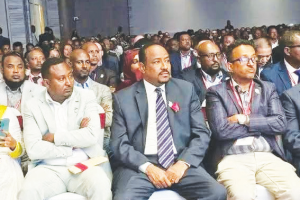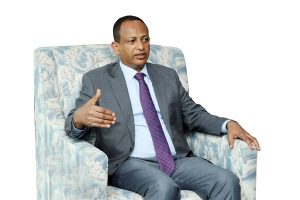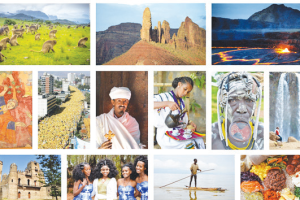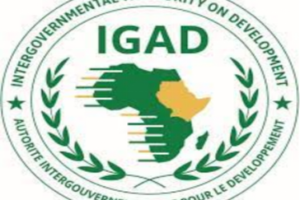Abraham saw his friend Daniel walking about fifty meters ahead of him on the same road. He quickened his pace and caught up with him and kicked him on his behind. Daniel turned around to reveal a face covered with a handkerchief.
“That’s what I call a perfect meeting of the minds!” said Abraham, giggling like he had never done before.
“I know what you mean. Your kick is the novel and creative way to greet people in the wake of coronavirus and my makeshift mask to fend off its virulent droplets,” Daniel replied with a wily smile.
Then, as they started walking together chatting, Abraham quipped:
“I must confess that you look awful with that far –from- clean piece of cloth around your face. Besides, you can’t stop microscopic viruses from entering your system with such an antediluvian device”.
Abrham had hardly finished his sardonic quip when Daniel, as if he had some life-changing revelation from some metaphysical source, ripped the not- so clean handkerchief from his face and shoved it back into his right trouser pocket and said:
“Aby, promise not to kick my ass again to greet me. Believe me, it’s pretty hard to differentiate between an attack and a greeting when they are both delivered in the form of a kick on your behind!”
As if on cue, they both let out a mightily hilarious giggle simultaneously. By the way, group giggling has become a trademark ritual of the Meles Zenawie generation of youths.
Abraham and Daniel continued their leisurely stroll down the road. Daniel spotted a poster hung at the top of a gate to what appeared to be a large conference hall. There was quite a lot of commotion in the compound where quite a few event organizers were moving here and there around the main entrance to the hall. The poster hung at the top of the gate read: “Dorze Nationality Election Rally”.
“Let’s go see what’s going on”, said Abraham. Daniel agreed without comment. As they approached the main gate, one of the organizers told them that they could both join the rally if they wanted to, adding: “you don’t have to be Dorzes to participate in the rally. After all, we are all Ethiopians.’’
Encouraged by the guy’s entreaties, Abraham and Daniel entered the hall where a Dorze firebrand was making an impassioned speech. It seemed that the Dorze firebrand had adopted the Martin Luther King grand public speaking style. Of course, he was speaking in Amharic but it was not that difficult to translate it into English in that stirring, “I have a dream that one day…rhetorical style. And towards the end of his speech he said in a reverberating voice: “I have a dream that one day all ethnicities in Ethiopia will share the 547 seats in the House of Peoples’ Deputies equally so that each of the 85 ethnicities will have an equal voting power of 6.43529 votes and that the country’s annual government budget of about 400 bn birr will be apportioned on the basis of this core individual- ethnic voting power, which works out at about 7.57093 percent, of course, irrespective of ethnic population size. In absolute terms, it comes to around 30.28372 bn birr for each of the 85 ethnicities! I have a dream…”
Abraham and Daniel looked at each other in utter befuddlement. Abraham harrumphed and managed to say: “The guy means what he says. He’s worked out the numbers to five decimal places. Come to think of it, how else could ethnicities be equal in a democracy unless their respective population numbers are totally disregarded? As you know, democracy is a matter of numerical majority and minority. Democracy in effect means majority rule. It’s pretty bleak for a Dorze whose ethnity numbers only about 300,000 to accept a political system where a Dorze is never likely to become a prime minister or commander- in- chief of the armed forces!”
A dumbfounded Daniel gazed at Abraham in complete disbelief and was only able to mumble:
“I never thought of it that way. It sounds unrealistic to me. An equal amount of about 30 bn for the Oromos and Dorzes! That works out at about 100,000 birr per capita for the Dorzes and only about 882 birr for the Oromos! What could be more crazy and unrealistic than that!”
“ You might as well say that about Meles Zenawi’s constitution, because that in essence is what it literally implies,” Daniel quipped nonchalantly.
Both Abraham and Daniel were rightly astounded at what seemed to be a confusing but true revelation about the perils of basing a country’s constitution on its various constituent ethnicities rather than on a single polity of equal citizens. It is self-evident that all the members of the 85 different ethnicities in Ethiopia will be absolutely equal in a democracy only if they are each counted as a single unit of a total of 110 million Ethiopians. In other words, a Dorze and an Oromo are equal only if they are each counted as an Ethiopian regardless of the sizes of their respective ethnic populations.
As the truth dawned on them in stark numerical terms, both Abraham and Daniel sobered up in quiet reflection. In due course, Daniel volunteered to speak first: “It seems Meles Zenawi was pretty good at deriving the differential of political calculus, but awful at figuring out the integral. In actual fact, what his constitution attempts to do is really squaring a circle!”
“We should give him credit, though for trying to equalize voting power at the Executive Committee and Central Committee levels at least for his TPLF outfit. All four members of the EPRDF have equal voting power of 9 votes and 45 votes each at the Executive and Central Committee levels, respectively, which means TPLF allegedly representing about 6 million people has equal voting power with OPDO and its Amhara equivalent, with a population each of about 34 and 28 million respectively,”
Abraham managed to go to great lengths to explain the rather bizarre voting system in these two powerful committees, which however were actually dominated by the TPLF.
But everybody with a nodding acquaintance with the Meles Zenawi-brand of Ethiopian politics knows that real power resides in the House of Peoples’ Deputies, where ethnicities are represented in proportion to their respective population sizes as follows:
No. of seats
- Oromo 178
- Amhara 137
- Tigre 38
- Somalia 24
- Benishangul–Gumz 2
- Afar 8
- Gambella 3
- Harari 1
And so on and so forth.
A glaring anomaly is the treatment of the people of Southern Ethiopia who are (all 56 so–called nations, nationalities and peoples) are packed into one “Kilil”, named just South. They collectively have been allotted a total of 122 parliamentary seats.
As Abraham and Daniel were carefully assessing the political situation based on these latest revelations, the Dorze firebrand brought the election rally to a close with the following words: “Thank you, Ladies and Gentlemen, for your kind patience, understanding and empathy. That is all for today. Have a good working week until we meet again soon”.
“Oh! I almost forgot today is Sunday,” said Daniel.
“Me, too,” Abraham responded. “What with this Gordian knot of squaring the circle of making numerically unequal human populations democratically equal, I have almost forgotten everything else!” Abraham continued:
“Well, the best solution, and perhaps the only one, is to call them all Ethiopians and treat them all as a single population”, Daniel stated the obvious as if it were a discovery or invention of Darwinian proportions.
“Or …” Abraham began hesitantly and continued, “or imposing a five-child policy for the smaller populations and a one –child policy for the bigger ones!”
“And what should we do in the meantime, I mean until the populations equalize?” Daniel asked
Abraham’s quick answer was: “Exist and live in Malthusian Limbo!”
The Ethiopian Herald March 29/2020
BY TEKLEBIRHAN GEBREMICHAEL





